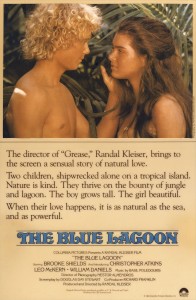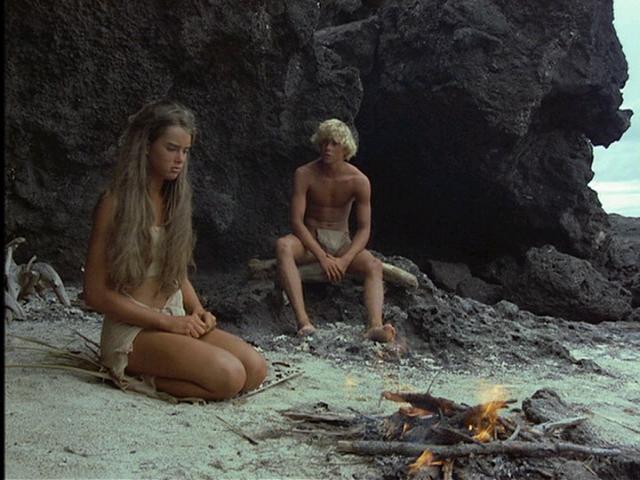“I have a funny feeling in my stomach.”
|

Synopsis:
Two shipwrecked children (Elva Josephson and Glenn Kohan) grow into teens (Brooke Shields and Christopher Atikins), and soon find themselves sexually attracted to one another.
|
|
Genres:
- Coming-of-Age
- Deserted Island
- First Love
- Sexuality
- Survival
Response to Peary’s Review:
As Peary notes, this “terribly made” remake of the “tasteful, enjoyable 1949 British film with Jean Simmons and Donald Houston has for years been mocked.” Brooke Shields deservedly won a Razzie Award for her performance here; while she’s undeniably gorgeous, she can’t act her way through even the simplest scenarios. Curly-headed Christopher Atkins is just as bad — as Peary notes, “every time he puts his hands on [Brooke], you want to gag.” The film’s sole redeeming feature is the stunning cinematography by Nestor Almendros, which ultimately deserves a much, much better movie.
Redeeming Qualities and Moments:
- Lush, Oscar-nominated cinematography by Nestor Almendros

- Hilariously awful acting by teen heartthrobs Shields and Atkinson

Must See?
No, though it’s worth a look simply for its historical notoriety.
Links:
|
One thought on “Blue Lagoon, The (1980)”
Not a must – unless viewed not as a film by Randal Kleiser but, instead, as a travelogue by Nestor Almendros. The great director of photography was given the perfect opportunity to strut his stuff when he was handed this project. His work is stunning, almost a character itself. Unfortunately Shields and Atkins keep walking in front of the camera, thus threatening to undermine Almendros at every turn. Fortunately he faces even that challenge admirably.
A good move was made in the decision to jettison the (1949) subplot of the pearl bandits. Makes for a simpler through-line.
In defense of the leads – if that’s possible – their roles are so precious as to be almost impossible to play. (This was true of the 1949 version.) But it begs the question: if Kleiser could manage to make Young Emmeline and (here) Richard more believable than their predecessors, couldn’t he have carried through? (Kleiser puts forward some daring dress-up with the children, having them at one point change gender roles. Even Leo McKern, as Paddy, does a drag act. Kleiser, of course – 16 years later – gave us the gay-themed ‘It’s My Party’.)
Its reputation notwithstanding, a young, straight audience may still find this more appealing than (in my case) an older gay one. The best sequence is when the leads are teaching their child to be ‘of the water’. It’s hard to know, though, who won’t chuckle during the sexual awakening that brings, oh!, the montages!